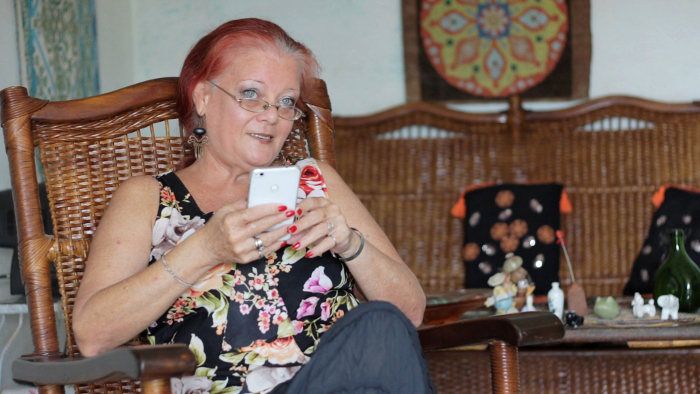
Camaguey, Apr 11th. - In the hot nights of Camagüey, there will still be those who believe to hear the dim sound of a violin, like an ancient echo. Maybe it comes from a literary rock, or from a corner where someone reads out loud one of those verses that mocked, without arrogance, of "versolibrismo" in vogue. There will be Mariela. Not physically, of course, but in the living memory of those of us who knew that poetry could have humor, commitment, tenderness, and even bitter coffee.
Mariela Perez-Castro is dead. Last night. And with her departure there is a cultured, deep, sharp voice, but also a woman woven with intimate gestures and very passions of hers: embroidery, reading, drawing, teaching, and above all, the word. The one who works, the one shared, the one that is given. As she herself said: inspiration is work, work and work.
She was a consecrated mother, a devout daughter - just days ago, she had lost her father, with whom she shared a loving relationship and a devotion to the deep Camagüey, who wanted to celebrate with the routes through the Cuban cities celebrating the 500 years. In Malú, her daughter, she overturned all the love and strength that inhabited her. And in the meantime, she wrote. Poet of depth, of sharp irony and confessed classicism, she built a work that deserved more noise, but that those of us who knew her there was a silent reading , with the reverence of the authentic.
In the pandemic lock-up, a video from the series Writers of the Camagüey showed it as it was: in her apartment, between coffee maker, cigars, tapestries, and a Siamese cat. She drew her face in precise strokes, made comics with the pandemic, read her poems from the cell phone, and said: poetry is the sum of the sum of all the arts. In less than three minutes, she revealed herself in full: voracious reader as a girl, granddaughter of a grandmother who read stories for her, creator of worlds that did not fit in books.
It was not uncommon to see her in a haiku workshop or to discuss Japanese influence on Cuban literature. Or cheering the Peña Sóngoro Cosongo with hosts Jesús Zamora and Antonio Batista, or giving life to a Literary Crusade that, since 2003, has been in mountains, prisons and villages to carry the feast of the word where the poets did not arrive. "We weren't going to war," she wrote, "but to the party of the word and the music."
She created, with six other "crazy" beautiful, that project of event of the Association Brothers Saíz (AHS) that still continues to roll paths. And she dreamed, along with Yunielkis Naranjo and other accomplices, of turning the headquarters of the Camagüey subsidiary into a large cultural complex. That dream was honored one day with the literary cafe La Comarca and its library-librería Esther Montes de Oca.
Her most cynical book, according to herself, was called while Mientras escojo arroz, and that sums up her way of being in the world: between the domestic and the extraordinary, between the verse and the kitchen, between laughter and seriousness. Always at the heart of the word.
Her body will be cremated on the morning of this Friday, and for a short time, her ashes will rest in her house.
Rest in peace, Mariela. Like you yourself said:
We'll have answered more questions
and venomous pieces shall remain
Vanquished by the urge to stay.
(Yanetsy León González/Adelante Digital) (Photo: Adelante Digital)